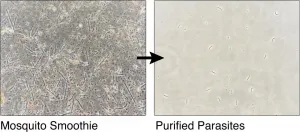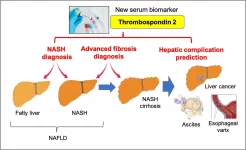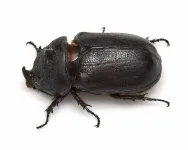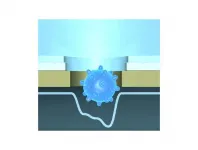(Press-News.org) Thousands of years ago, archaic humans such as Neanderthals and Denisovans went extinct. But before that, they interbred with the ancestors of present-day humans, who still to this day carry genetic mutations from the extinct species.
Over 40 percent of the Neanderthal genome is thought to have survived in different present-day humans of non-African descent, but spread out so that any individual genome is only composed of up to two percent Neanderthal material. Some human populations also carry genetic material from Denisovans - a mysterious group of archaic humans that may have lived in Eastern Eurasia and Oceania thousands of years ago.
The introduction of beneficial genetic material into our gene pool, a process known as adaptive introgression, often happened because it was advantageous to humans after they expanded across the globe. To name a few examples, scientists believe some of the mutations affected skin development and metabolism. But many mutations are yet still undiscovered.
Now, researchers from GLOBE Institute at the University of Copenhagen have developed a new method using deep learning techniques to search the human genome for undiscovered mutations.
"We developed a deep learning method called 'genomatnn' that jointly models introgression, which is the transfer of genetic information between species, and natural selection. The model was developed in order to identify regions in the human genome where this introgression could have happened," says Associate Professor Fernando Racimo, GLOBE Institute, corresponding author of the new study.
"Our method is highly accurate and outcompetes previous approaches in power. We applied it to various human genomic datasets and found several candidate beneficial gene variants that were introduced into the human gene pool," he says.
The new method is based on a so-called convolutional neural network (CNN), which is a type of deep learning framework commonly used in image and video recognition.
Using hundreds of thousands of simulations, the researchers at the University of Copenhagen trained the CNN to identify patterns in images of the genome that would be produced by adaptive introgression with archaic humans.
Besides confirming already suggested genetic mutations from adaptive introgression, the researchers also discovered possible mutations that were not known to be introgressed.
"We recovered previously identified candidates for adaptive introgression in modern humans, as well as several candidates which have not previously been described," says postdoc Graham Gower, first author of the new study.
Some of the previously undescribed mutations are involved in core pathways in human metabolism and immunity.
"In European genomes, we found two strong candidates for adaptive introgression from Neanderthals in regions of the genome that affect phenotypes related to blood, including blood cell counts. In Melanesian genomes, we found candidate variants introgressed from Denisovans that potentially affected a wide range of traits, such as blood-related diseases, tumor suppression, skin development, metabolism, and various neurological diseases. It's not clear how such traits are affected in present-day carriers of the archaic variants, e.g. neutrally, positively or negatively, although historically the introgressed genetic material is assumed to have had a positive effect on those individuals carrying them," he explains.
The next stage for the research team is to adapt the method to more complex demographic and selection scenarios to understand the overall fate of Neanderthal genetic material. Graham Gower points out that the team aims to follow up on the function of the candidate variants in the genome that they found in this study.
Looking forward, it remains a challenge to search the human genome for genetic material from as yet unsampled populations, so-called ghost populations. However, the researchers are hopeful that they can further train the neural network to recognize mutations from these unsampled populations.
"Future work could also involve developing a CNN that can detect adaptive introgression from a ghost population, for cases in which genomic data from the source is unavailable," says Graham Gower.
INFORMATION:
A study carried out by the Institute of Environmental Science and Technology of the Universitat Autònoma de Barcelona (ICTA-UAB) and the Instituto de Saúde Pública of the University of Porto (ISPUP), concludes that exposure to natural spaces during the first COVID-19 lockdown in 2020 was beneficial for the mental health of Spanish and Portuguese citizens.
The research shows that, in Portugal, during the first confinement, people who maintained or increased contact with natural public spaces, such as parks and coastal areas, or who could contemplate these spaces from their homes, presented lower levels of stress, psychological distress and psychosomatic symptoms.
In Spain, those who maintained or increased contact with private natural ...
"Boomers" and "millennials" who go to church are more likely to trust their neighbours and donate to charity, according to a new study.
Religious beliefs and participation help close the gaps in civic participation between millennials and their elders, researchers have found.
Experts have measured the social "capital" religion gives people of all ages. They found those in their 20s and 30s were less likely to join groups and associations, and less likely to be religious, but being involved with the church gave them more "religious capital" than older people who also attended services.
The study shows boomers often have more social capital than millennials and are more likely to be religious. Religious ...
A faster method for collecting pure malaria parasites from infected mosquitos could accelerate the development of new, more potent malaria vaccines.
The new method, developed by a team of researchers led by Imperial College London, enables more parasites to be isolated rapidly with fewer contaminants, which could simultaneously increase both the scalability and efficacy of malaria vaccines.
The parasite that causes malaria is becoming increasingly resistant to antimalarial drugs, with the mosquitoes that transmit the disease also increasingly resistant to pesticides. This has created an urgent need for new ways to fight malaria, which is the world's third-most deadly disease in under-fives, with a child dying from malaria every two minutes.
Existing ...
Ibaraki, Japan - Severe childhood restrictive cardiomyopathy is a condition that causes the muscles in the walls of the heart to become stiff, so that the heart is unable to fill properly with blood. A mutation in a protein called BAG3 is known to result in restrictive cardiomyopathy, muscle weakness, difficulty taking in enough oxygen, and damage to multiple peripheral nerves, often shortening the patient's lifespan significantly. Until now there has been no successful model for the disease, making it extremely difficult to study.
However, researchers in Japan and Germany have now created a mouse model that mimics the human pathology, allowing the disease to be studied more easily. The team's data suggest ...
Osaka, Japan - Nonalcoholic fatty liver disease (NAFLD) is the most common liver disease worldwide and can progress to liver cirrhosis, liver failure or cancer. Currently, nonalcoholic steatohepatitis (NASH) diagnosis requires an invasive liver biopsy which can lead to procedural complications. Now, researchers at Osaka University working with international collaborators have identified a noninvasive biomarker that can identify patients at risk of NAFLD complications using a simple blood test.
Owing to the increasing prevalence of obesity worldwide, ...
The electroreduction of carbon dioxide (CO2) to produce value-added multicarbon compounds is an effective way to cut down CO2 emission. However, the low solubility of CO2 largely limits the application of related technology.
Although gas diffusion electrode (GDE) can accelerate the reaction rate, the instability of the catalysts caused by electrolyte flooding hinders further reaction.
Recently, inspired by setaria's hydrophobic leaves, Prof. GAO Minrui's team from University of Science and Technology of China developed Cu catalyst composed of sharp needles which possesses high level ...
When animals are hot, they eat less. This potentially fatal phenomenon has been largely overlooked in wild animals, explain researchers from The Australian National University (ANU).
According to lead author Dr Kara Youngentob, it means climate change could be contributing to more deaths among Australia's iconic marsupials, like the greater glider, than previously thought.
"Hot weather puts all animals off their food. Humans can deal with it fairly well; we usually have plenty of fat reserves and lots of different ...
A destructive pest beetle is edging closer to Australia as biological controls fail, destroying home gardens, plantations and biodiversity as they surge through nearby Pacific islands.
University of Queensland researcher Dr Kayvan Etebari has been studying how palm-loving coconut rhinoceros beetles have been accelerating their invasion.
"We thought we'd outsmarted them," Dr Etebari said.
"In the 1970s, scientists from Australia and elsewhere found that coconut rhinoceros beetles could be controlled with a beetle virus from Malaysia.
"This virus stopped the beetle in its tracks and, for the last 50 years or so, it more-or-less stayed put ...
As demand for electricity rises and climate change brings more frequent and extreme storms, residents in rural and suburban communities must have access to the minimal electricity they need to survive a large, long-duration (LLD) power outage.
A new study in the journal Risk Analysis compared strategies for providing emergency power to residents in two hypothetical New England communities during such an event. The results suggest that cooperative strategies like sharing a higher capacity generator among multiple homes cost 10 to 40 times less than if each household used its own generator.
"Our findings provide impetus for utilities, regulators, ...
Osaka, Japan - A team of scientists headed by SANKEN (The Institute of Scientific and Industrial Research) at Osaka University demonstrated that single virus particles passing through a nanopore could be accurately identified using machine learning. The test platform they created was so sensitive that the coronaviruses responsible for the common cold, SARS, MERS, and COVID could be distinguished from each other. This work may lead to rapid, portable, and accurate screening tests for COVID and other viral diseases.
The global coronavirus pandemic has revealed the ...




